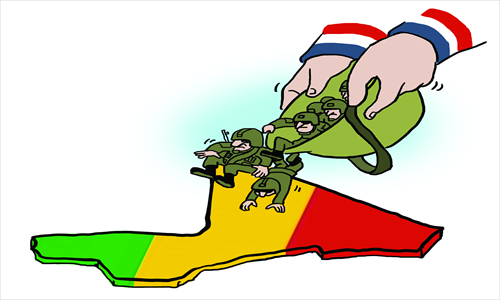Hollande has set alarming precedent for intervention

Since France launched military strikes against Mali rebels on January 11, the little-known West African country, which has been mired in a crisis for over a year, suddenly came under the media spotlight and made headlines around the world.
In view of the developing situation on the ground, the high-profile move by French forces has directly turned the tables and objectively enhanced France's influence in Africa while at the same time boosting its international status.
It has been reported that Malians waved the French flag in celebration after Malian troops regained control of Konna, a town that plays a pivotal role in the conflict.
Mali was one of the first sub-Saharan countries to establish diplomatic ties with the People's Republic of China, and Sino-Malian relations have been good. In addition to this, China has certain interests in Mali through its investment projects.
It is not necessarily a bad thing for China if France's decision to send in troops can stabilize the situation in this West African country.
However, despite all the potential benefits, there is one possible cause for alarm - French forces' involvement in Mali will provide the case for legalization of a new interventionism in Africa.
It's true that France's decision to send troops to Mali was directly caused by the fact that northern rebels had captured the strategic town of Konna, which endangered the Malian government as well as the capital, Bamako. At the request of Mali's interim president, Dioncounda Traore, France deployed fighter jets.
Although France became involved in Mali under the banner of anti-terrorism, it is not entirely accurate to say that Malian rebels are terrorists. The nature of the Mali issue is more akin to that of a civil war among different political groups.
Compared with other regions across the world, Africa is a special continent where a majority of nations gained independence after World War II, and the borders of each nation were mostly demarcated by its former colonial masters.
Therefore, Africans' sense of national identity and concept of sovereignty is quite weak, while their sense of ethnic and religious identity is much stronger. This creates opportunities for Western and other outside forces to intervene in the internal affairs of African countries.
Africa is a region where France has had the deepest impact and operated for the longest period of time. Former president Charles de Gaulle and successive governments have all seen Africa as a "forward base" to support France's leadership, regard maintaining France's special interests in French-speaking African countries as a core of African policy, and stress that France would become a second-rate country without Africa.
Moreover, France's direct economic interests in Mali cannot be underestimated. That's why President François Hollande, who is said to have "the least interest in Africa," reversed his low-key image and decided to actively intervene in the continent.
Of course, France's involvement in Mali is still a risky business. One of the drawbacks of this action is that it brings back memories of the "African gendarmerie" - France's colonial status.
Although France explained its move as a request from the current government, the same request from the president of the Central African Republic, which also faced an offensive from rebels, failed to get help due to France's own interests. France then bears the blame for acting with double standards in African affairs as an African gendarmerie. In addition, committing troops to Mali brings added burdens to the stagnant French economy.
As a result, international opinion is beginning to suspect that France may be repeating the missteps of the US in Afghanistan. Whether France can create long-term stability in Mali is far from certain.
The author is a director of African Studies under the Institute of West Asian and African Studies, the Chinese Academy of Social Sciences. opinion@globaltimes.com.cn